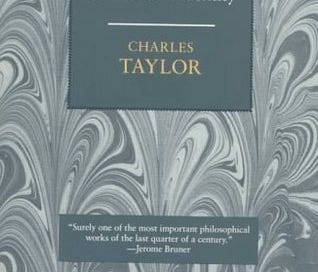Sources of the Self: The Making of Modern Identity by Charles Taylor
A classic tackled at last
Before we moved from Colorado last year, I decided to take up an offer to attempt to climb a 14-er, a peak of 14,000 feet. I’d done a lot of hiking in the 7,000-9,000-foot range, and I felt that I was in pretty good shape—for my age bracket. But climbing a 14-er, even starting at around 12,000 feet, would be quite the challenge. It’s up, up, up, and with thinner and thinner air. With about every hike in the mountains of Colorado, you begin by going up. And up. I got in the habit of starting with a sense of determination for each hike, but especially the 14-er, I was focused on getting to the top. And, as with everything, there’s a price to pay: one reduces one’s ability to slow-down and take in the scenery along the way. In fact, it’s only when one as climbed a while that your growing fatigue compels you to slow down, and, thereby, enjoy the view. The higher you go, the more you have to rest, and thus the more scenery you take in. And as you attain higher altitudes, the scenery increases in grandeur, scope, and beauty.
So it is with some books, those that, as Robert Pirsig describes it, take you to the “high country of the mind.” This is such a book. It consists of 521 pages of text, plus about another 50 pages of end notes. The book begins by setting forth the nature of the inquiry and some of Taylor’s general philosophical perspectives before plunging into a history of western philosophy and art (primarily poetry) that defines our sense of ourselves, especially as moral animals. This is indeed high altitude stuff in a mountain of a book. And, because I was eager to achieve the summit of this work (i.e., complete reading it), I went a little fast over some very scenic terrain before slowing down more to take in the text. But even then, I’m hard-pressed to recreate Taylor’s arguments, their having come as fast and as high as they did. After the initial statement of his philosophical premises and intentions that I noted above, Taylor takes on a journey through Western philosophy. He begins with Plato and then moves on to Augustine, Descartes, Locke, Protestant divines, the radical Enlightenment, the Deists, and Kant, before moving over more into poetry, belles lettres, and criticism in the nineteenth and twentieth centuries. It was indeed a steep and hard climb, and I must admit that the enterprise taxed my meager mental resources. But that being said, I did make it to the end (unlike my quest to attain a 14-er; I tapped out at 13,200 on that try). But while I doubt that I’ll ever try a 14-er again, I do plan to return this book. In fact, my next planned adventure in the high country of the mind will be Taylor’s A Secular Age, his follow-up (about 20 years later) to Sources. (Building intellectual mountains takes time.) And I plan on returning to Sources as well, to take in more appreciatively and lastingly the vistas that Taylor offers on this journey.
I realize that what I’ve written here is more like a short movie trailer—an appreciation, a teaser—than a book review or report. But if you’re so inclined, if you wonder how our culture has come to be as it is, what “modernity,” “instrumental reason,” “Romanticism,” and “Modernism,” are all about—to take just a few random examples—then I hope that you’ve learned that this mountain of a book will prove worth the climb. And if you venture it, I’ll hope to wave to you from the adjoining peak.




I specifically think Chapter 2 is worth reading as a stand alone. The historical development of how we understand ourselves (rest of the book) is also brilliant and worthy, but it will appeal to less people. Even ahistorical people will enjoy Chapter 2 iirc.
I don't think I ever got completely through A Secular Age. I get too wrapped up in processing thoughts from a few chapters, so I feel unready to tackle more! I will never think about "the secular" in the same way again. It reminds me of Ricoeur's second naivete. Secularity is not anti-religious. It just changes completely the way you have to "be" religious (if you are).